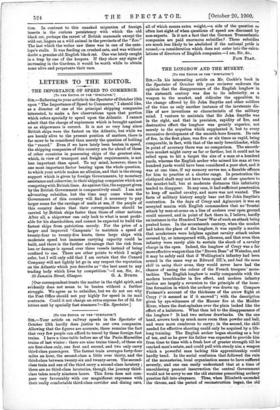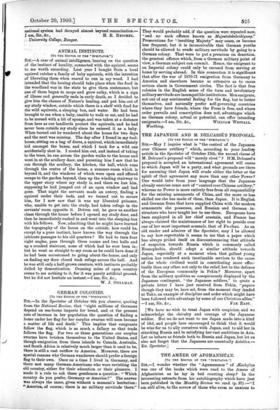THE LONGBOW AND THE MUSKET.
[To THE EDITOR OP THE "SPECTATOR."] SIR,—In his interesting article on Mr. Cockle's book in the Spectator of October 6th your reviewer endorses the opinion that the disappearance of the English longbow in the sixteenth century was due to its inferiority as a weapon to the musket, and ridicules the opposition to the change offered by Sir John Smythe and other soldiers of the time as only another instance of the inveterate dis- like of new inventions so characteristic of the military mind. I venture to maintain that Sir John Smythe was in the right, and that in precision, rapidity of fire, and destructive effect the longbow was greatly superior, not merely to the arquebus which supplanted it, but to every successive development of the smooth-bore firearm. Its rate of fire, in the first place, was five or six times as rapid, being comparable, in fact, with that of the early breechloader, while in point of accuracy there was no comparison. The smooth- bore musket might carry as far or farther, but it could not be relied upon to hit a target the size of a man at a handred yards, whereas the English archer who missed his man at two hundred yards would have been considered a poor shot, and it was at one time, if my memory serves me, a fineable offence for him to practise at a shorter range. In penetration the clothyard shaft may not have been equal at close quarters to the musket-ball, but at moderate distances this inferiority tended to disappear. In any case, it had sufficient penetration to keep off mailed cavalry, and more was not wanted. The facts of military history amply bear out Sir John Smythe's contention. In the days of Crecy and Agincourt it was an accepted maxim with English commanders that no' frontal attack by men-at-arms on a line of archers over open ground could succeed, and in point of fact there is, I believe, hardly an instance in the Hundred Years' War of such an attack being pushed home. In the seventeenth century, when the musket had taken the place of the longbow, it was equally a maxim that musketeers were helpless against cavalry attack unless covered by, or interspersed with, pikemen, and that even then infantry were rarely able to sustain the shock of a cavalry charge in the open. Indeed, the longbow of Crecy was a far more effective weapon than the "Brown Bess" of Waterloo, and it may be safely said that if Wellington's infantry had been armed in the same way as Edward Ill.'s, and had the same skill in using their arms, they would never have had the chance of seeing the colour of the French troopers' mous- tachios. The English longbow is really comparable with the modern breechloader in fire effect, and modern infantry tactics are largely a reversion to the principle of the loose- line formation in which the archery was drawn up. Compare Froissart's account of the thickness of the arrow flight at Crecy (" it seemed as if it snowed") with the description given by eye-witnesses of the Hauser fire at the Modder River, where the dust-splashes over the plain looked like the effect of a hailstorm. What then led to the disappearance of the longbow ? It had two serious drawbacks. On the one hand, arrows took up much more room than powder and ball, and were more cumbrous to carry; in the second, the skill needed for effective shooting could only be acquired by a life- long training. The English archer began shooting as a boy of ten, and as he grew his father was expected to provide him from time to time with a fresh bow of greater strength till he reached man's estate, and could pull with steady aim a weapon which a powerful man lacking this apprenticeship could hardly bend. In the social confusion that followed the ruin of the monasteries, local organisation seems to have suffered severely, and one can easily understand that at a time of smouldering peasant insurrection the central Government would not be sorry to see the old statutes prescribing archery practice fall into abeyance. • Thus, when Elizabeth ascended the throne, and the period- of reconstruction began, the old
national system had decayed almost beyond resuscitation.-







































 Previous page
Previous page